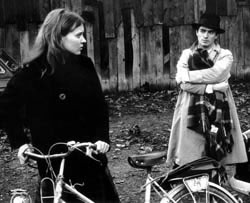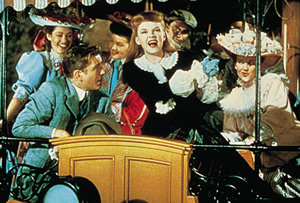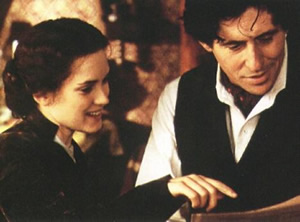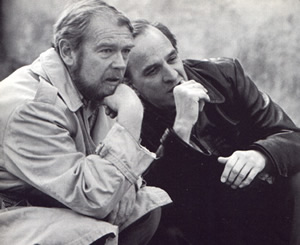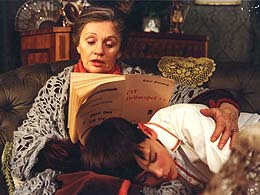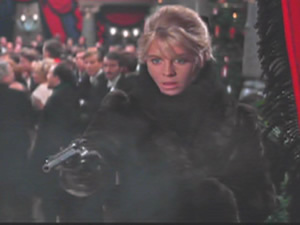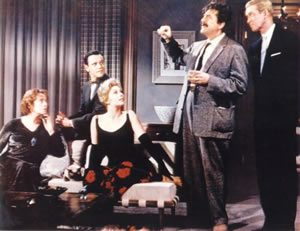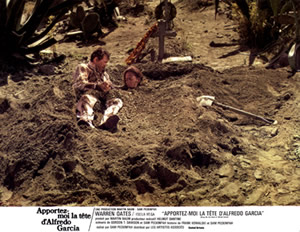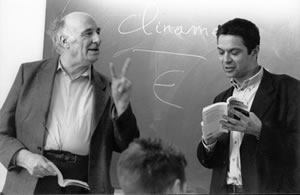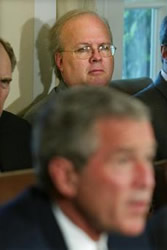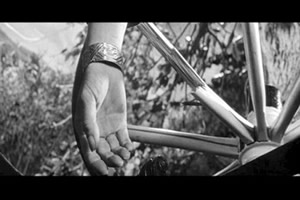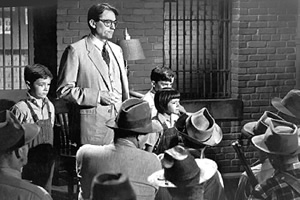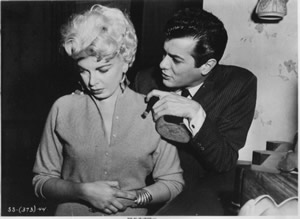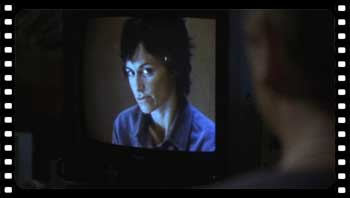
"It is very likely that nearly every one has been very nearly certain that something that is interesting is interesting them" — Gertrude Stein
December Pop Comp - courtesy of the invaluable mp3 blogs
Call Me - N'Dambi | Human Behavior - The Decembrists | Grab This Thing - The Mar-Keys | James Vs. The Reds - Stratageme | At the Back of the Shell - The Kills | Struggle Against - Matmos | Neighborhood #3 (Power Out) - The Arcade Fire | Under Heavy Manners - Robert Fripp and David Byrne | Jolene (live) - The White Stripes | The District Sleeps Alone - The Postal Service | Wasp Nest - The National | Blood Hound Blues - Victoria Spivey | Single Again - The Fiery Furnaces | Dear Sons and Daughters of Ghosts - Wolf Parade | This Ain't No Picnic - Minutemen | Fix Up, Look Sharp - Dizzee Rascal | Fairytale of New York | The Pogues
Screen Memories — the holiday half of December (reverse order)
§ Band of Outsiders | Dir. Jean-Luc Godard, 1964 | 95min | Sundance | imdb | First viewing - I finally "get" Anna Karina now (how slow is that?).
§ Coffee and Cigarettes | Dir. Jim Jarmusch , 2003 | 95min DVD | imdb | First viewing - Self-indulgent but fitfully amusing; it's hard for me to admit that Jarmusch (the only director I've ever felt generationally affiliated with) is aesthetically spent after so few fully realized projects, but how avoid the thought at this point?
§ It's A Wonderful Life | Dir. Frank Capra, 1946 | 130min VHS | imdb | Has a "compulsory" holiday film ever been so brutally depressing? It seems more so to me every year. (Which reminds me that I never got around to the magnificent Meet John Doe this season, though I had it on hand and meant too.)
§ The Dead | Dir. John Huston, 1987 | 83min | imdb | Suffers in comparison to Bergman (see below), but is otherwise unscathed after nearly annual viewings since the year of its release. Cathleen Delaney's performance as Aunt Julia especially struck me this time through, even if Huston's handling of her has come to seem brusque in one or two shots where the director stares too directly at her expiring life.
§ Holiday Inn | Dir. Mark Sandrich, 1942 | 100min | imdb
§ Meet Me in St. Louis | Dir. Vincente Minnelli, 1944 | imdb | Second viewing - still not very impressed, though there are a few more interesting scenes than I'd recalled, especially in the Halloween passages.
§ Little Women | Dir. Gillian Armstrong, 1994 | 115min | imdb
§ The Making of Fanny and Alexander | Dir. Ingmar Bergman, 1983 | 110min DVD | Criterion Collection 264 | imdb | First viewing - Bergman's patient blocking and choreographing of complex scenes, his ease with the children (Pernilla Allwin, who plays Fanny, is an especially gleeful accomplice), the proximity he insisted upon when shooting a scene (often directing from an invisible space within the shot itself), and a million other details fascinate me in this excellent documentary. Perhaps the scene with Gunnar Björnstrand is held too long—but how turn away from such a pained farewell within a farewell?
§ Fanny and Alexander: The Television Version | Dir. Ingmar Bergman, 1982 | 312min DVD | Criterion Collection 262 | imdb | First viewing of this astonishing five-hour expansion of the theatrical release I've loved for years. Perhaps the single best addition is the scene in which Gustav Adolph and Carl negotiate with the Bishop for Emilie's release after Isak has spirited the children away, but there is so much new to see that I've only begun to drink it all in. The added time spent with her only intensifies my crush on Madame Ekdahl, as played by Gunn Wallgren (shown below reading Strindberg's "Dream Play" at the close of the film)—but that's a topic I'll reserve for private conversation.
§ Doctor Zhivago | Dir. David Lean, 1965 | 197min VHS | imdb | Not a favorite film of mine, but it always repays rewatching—even if the balalaika induces mild insanity and the symbolism is so heavy handed that the whole film can sometimes come to feel like the emotional equivalent of a "large-print edition."
§ Bell, Book, and Candle | Dir. Richard Quine, 1958 | 106min | imdb | First complete viewing — An allegory for quitting queer culture and trying one's best to prefer the heterosexual norm, even if it's aging badly. Kim Novak's revenge on Jimmy Stewart for Vertigo?
Lost Time | mid-November to mid-December
Screen Memories Prompted by the course I've just finished teaching, I made a point of finally seeing all four films that take Proust and/or his Search for Lost Time as their occasion: Percy Adlon's irresistible Céleste (1981), a German adaptation of Céleste Albaret's memoir of her years in the employ of Monsieur Proust; the easily mocked but not so bad as all that Swann in Love (1984) directed by Volker Schlöndorff with Ornella Muti as Odette and Alain Delon as a perfectly cast but largely wasted (in terms of the latent kinkiness in the role) Baron de Charlus; Chantal Akerman's very free adaptation of La Prisonniére, La Captive (2000), with Sylvie Testud as Albertine (more or less) and plot variations borrowed from Vertigo and Chopin's The Awakening; and Raoul Ruiz's Time Regained (1999), a smart and often beautiful reading of the closing volume of the Search. Strangely, only the Adlon "works" as a stand-alone film, but each contributes something to the project of envisioning (and en-sounding) the lifeworld evoked in Proust's novel. • Speaking of Sounds: After five years of making do with a dumb speaker arrangement, we finally shifted to a more deliberate and acoustically apt strategy a few weeks ago, revealing many a previously buried sonic element in things like Four Tet's Pause (2001), Jim O'Rourke's almost-insane-making hurdy-gurdy drone composition Happy Days (1996), and the Emerson String Quartet's recordings of Beethoven's late string quartets. And when news of Jackson Mac Low's death came, it was nice to hear his voice mingling with Anne's in the "Phoneme Dance in Memoriam John Cage" from the invaluable Open Secrets cd. • As to Print, Jimmy Schuyler's Just the Thing: Selected Letters, 1951-1991 is just about the only bound & paginated thing I've been able to pay attention to at the margins of my days: I started in the mid-60s (circa the Nest of Ninnies collaboration), then read a batch from the '80s and '90s (including the great late reading tour), then went back to the beginning. Bruce Hainley's appreciation will have to do for now, though perhaps Ange Mlinko's remarks in November are the quicker route to the heart of the matter: "To be steeped in Schuyler’s letters—just published—is to find one’s own world suddenly wearing his colors; and it is a more marvelous world for being all heart, sensibility, and well-written. It overflows with references to books, movies, and music. It conjures a world where people want to give one another pleasure, especially verbal pleasure. It is, finally, a lost world, and one measure of how far we've fallen is the recent shrinkage of what's intelligent to what's intellectual." • While in San Francisco for a few days at the end of November, I found plenty of evidence that the world Ange considers lost is only hiding—and more often than not, as Schuyler is exactly the right poet to remind us, hiding in plain sight. I glimpsed it in Kelly Holt's living room, where I finally was able to meet Stephanie Young and to see so many friends and acquaintances from whom the whole stupid country now separates me, and I experienced it also over dinner with Kevin Killian and Dodie Bellamy the night before, at a quiet lunch with Michael Palmer earlier that day, at the 500 Club for cocktails and a Ramones-heavy jukebox with Chris Stroffolino, Juliana Spahr, Bill Luoma, and Charles Weigl, and so on. Humor, intelligence, warmth, and integrity—along with a healthy dash of hedonism—are the continued attractions of the poetry community to this day: to be in the tradition of Schuyler and Mac Low is to enjoy them wherever you're lucky enough to find them.
§ November Pop Comp - courtesy of the invaluable mp3 blogs
Matmos - Action at a Distance | The Arcade Fire - This Must Be The Place (live cover) | Andrews Sisters and Danny Kaye - Civilization | The Ataris - Heave in Falling | The Honeydrippers - Impeach the President | Blackalicious - Paragraph President | Langston Hughes - Freedom Road | Eddie Kendricks - Girl You Need to Change Your Mind | Arto Lindsay - Q Samba | White Stripes - Fell in Love with a Girl (live acoustic) | Aqualung - Strange & Beautiful | Bettye Swann - Make Me Yours | Sleater-Kinney - I Wanna Be Your Joey Ramone | Radiohead / Four Tet - Scatterbrain | Pavan - Panik Mix | Depeche Mode - Clean (colder version) | Mark Putney - Don't Come Around Here No More
8 November — Monday
§ Bring Me the Head of Alfredo Garcia | Dir. Sam Peckinpah, 1974 | 112min | IMDb link
§ Omar Berrada | La nuit la poésie: Poésie de France et des Etats Unis | Featuring Jacques Roubaud, Rosmarie Waldrop, Keith Waldrop, Juliette Valery, and Charles Bernstein | Emission du 01 Novembre 2004 | France Culture | page link | listen link
5 November — Friday
§ Fire | Dir. Deepa Mehta, 1996 | 108min Sundance | IMDb link
3 November — Wednesday
"The dissent beckons / as the assent beckoned..."
§ Second October Pop Comp - courtesy of the invaluable mp3 blogs
Monty Alexander - Love & Happiness | Improved Sound Ltd. - Leave This Lesbian World | Air - Alpha Beta Gaga | Devendra Banhart - At the Hop | The Essex Green - The Late Great Cassiopeia | Broken Social Scene - Almost Crimes | Mouse on Mars - Substance | Galaxie 500 - Strange | Nouvelle Vague - This Is Not a Love Song | Neil Young - Computer Age | Radiohead - Cinnamon Girl (live cover) | Plastic Bertrand - Ca Plane Pour Moi | Yo La Tengo - Autumn Sweater | Dungen - Festival | Saul Williams - Grippo | Autechre - Lentic Catachresis
31 October — Sunday
§ The Haunting | Dir. Robert Wise, 1963 | 112min TCM | IMDb link
30 October — Saturday
§ Psycho | Dir. Alfred Hitchcock, 1960 | 108min TCM | IMDb link
29 October — Friday
§ Tomson Highway | Performing excerpts and musical numbers from his plays | Minsky Recital Hall, University of Maine | bio
28 October — Thursday
§ To Kill a Mockingbird | Dir. Robert Mulligan, 1962 | 129min | TCM | imdb
27 October — Wednesday
§ Boston Red Sox win the world series
26 October — Tuesday
§ DJ John Peel has died of a heart attack while vacationing in Peru | Guardian Obit | Radio 1 tribute
24 October — Sunday
§ Elaine Stritch At Liberty | Constructed by John Lahr, Reconstructed by Elaine Stritch | Wilbur Theater, Boston
23 October — Saturday
§ The Sweet Smell of Success | Dir. Alexander Mackendrick, 1957 | imdb | Brattle Theater, Cambridge
17 October — Sunday
§ Site Note
Added a new poetry link, Minor American, and two new mp3 links: Aurgasm and Royal Music.
15 October — Friday
§ Poetry Blogs - Determinate Negation Edition
Scissorologist Jack Kimball gets stereo-memic, crosscutting the New York Times and the Poetry Project Newsletter: Since the dawn of the film industry ... Since the dawn of poetics. "How bizarre that Steve Evans would allow this matter to enter into public parlance," said John Kinsella a Fellow of Churchill College, Cambridge University. "In situations like this historically, it's not worthy of open discussion; you settle outside very, very quietly." • Meanwhile, Ululations makes me wonder if Buddy Cianci's Providence didn't shape more of my imagination than I'd previously realized.
13 October — Wednesday
§ Art Spiegelman | In the Shadow of No Towers | New York: Pantheon, 2004 | 17 plates | $19.95
11 October — Monday
§ Site Notes
I've posted an 800-word review of Laura Moriarty's Self-Destruction to the Notes page. I've also added a few new links, including Christopher Fritton's interesting Ferrum Wheel site, the Political Theory Daily Review, Steve Burt's live journal Accommodatingly, and the Not Bored! site (be sure to check out the Surveillance Camera Players). I've also restored a link to Indymedia, who've recently had their London-based servers confiscated by the FBI.
§ October Pop Comp - courtesy of the invaluable mp3 blogs
Fennesz - Rivers of Sand • Poto & Cabengo - Life in San Diego • Beth Orton - Carmella (Four Tet Remix) • Ranier Maria - Breakfast of Champions • The Stranglers - Peaches • The Fall - Clasp Hands • Gang of Four - Damaged Good (live in NYC 1979) • Le Tigre - On the Verge • Tuxedo Moon - Chinese Mike • The Detachment Kit - Ricochet • Franklin Bruno - Thin Weak Smile • Jim O'Rourke - Halfway to a Threeway • The Fiery Furnaces - Crystal Clear • Supreme Nyborn - Rhymes of a Swiftmind • RJD2 - The Takeoff
§ Screen Memories - glimpses, mostly
Move Over Darling (dir. Michael Gordon, 1963). • The Bachelor and the Bobby-Soxer (dir. Irving Reis, 1947). • The Big Chill (dir. Lawrence Kasdan, 1983). • Showgirls (dir. Paul Verhoeven, 1995). • The Prizefighter and the Lady (dir. W.S. Van Dyke, 1933). • Radiohead at Les Eurockeenes de Belfort, France, concert festival 2003.
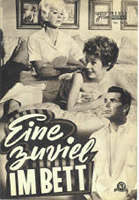

18 September — Saturday
§ Poetry blogs
Juliana Spahr and Jena Osman have created CHAIN re:ACTION, a forum for the discussion and creation of political poetry. • And Barrett Watten embarks on a "one-year plan": "Weekly posts of text and comment on poetics, media, politics, and culture September 2004–September 2005." • At Hotel Point, John Latta suspends his Proustian researches long enough to appreciate James Wagner's the false sun recordings. • And Harlequin Knights calls attention to an Artforum article on the Bernadette Corporation and Le parti imaginaire. • Brian Kim Stefans talks about /ubu with Mónica de la Torre at The Brooklyn Rail: "That’s the interesting question: can you use processes that involve non human actors to create resonant works? Cyberauthors are a bit focused on getting machines to do things for them, like garage alchemists, but it’s not obvious that the results will be very interesting literary works." • And the slow pirates manifesto turns another page at Sugar High! "Society—ours, now —takes a form in which technology is not allowed to free one from either labor or rent (here one recalls the fabulous futures promised in the first half of the last century, wherein robots were going to deliver unto us oodles of leisure time; funny how the gear kept coming, but that particular offer was withdrawn into a titanium-plated silence). The promise that tech is allowed to make now is that you can work anywhere so as to live somewhere." • The transplanted Lime Tree takes root in Ashland. • Dagzine stirs from its exams induced dormancy. • And I'll be taking a rest from God Save My Blog and Chatelaine's Poetics for a spell. Wake me when the promo's over. • It's forever ago by now, but Mosses from an Old Manse got me to put Colossal Youth on the turntable for the first time in more than a year. It's more or less one move all the way through, but it's a very nice move. (If the permalink misleads you, scroll down to September 3).
12 September — Sunday
§ Random Harvest | Dir. Mervyn LeRoy, 1942 | 125min | Screened on TCM | IMDb link
"A shell-shocked World War I amnesiac (Ronald Colman) marries a music-hall singer (Greer Garson), but a collision with a taxi makes him forget her and return to his original family. James Agee compared watching this 1942 MGM feature, derived from a James Hilton story, to eating a bowl of shaving soap for breakfast, but it has a kind of deranged sincerity and integrity on its own terms, and it acquired a slew of Oscar nominations" (Jonathan Rosenbaum, Chicago Reader capsule). • Colman's character can barely speak when Garson inexplicably adopts him amidst chaotic armistice celebrations, but with her as muse he attains articulation and in the still above holds his first check in payment for an article he's written. The usual delusions follow, but he's saved from monogamy, fatherhood, and a writing career by the resumption of his old identity as heir to Random Hall.
8 September — Wednesday (and after)
§ Most of The Thin Man (dir. W.S. Van Dyck, 1934), all of After the Thin Man (dir. W.S. Van Dyck, 1936), and some of Shadow of the Thin Man (dir. W.S. Van Dyck, 1941). Part of TCM's September focus on Myrna Loy.
6 September — Monday
§ Frank Rich | "How Kerry Became a Girlie-Man" | New York Times | 5 September 2004 | link
§ Eduardo Mendieta | "America and the World: A Conversation with Jürgen Habermas | Logos | link
§ Lewis Lapham | "Tentacles of Rage: The Republican Propaganda Mill, a Brief History" | Harper's | September 2004 | link
30 August — Monday
§ Ça commence
A class, another class, the reading series.
26 August — Thursday
§ Poetry Blogs, early in the era of "next blog"
A navbar cento at Konvolut M. • Silliman finds "a crispness to every sentence...that cannot be faked" in David Perry's New Years. • While Hotel Point gathers the ingredients for an unwritable essay on Silliman. • "What trampolines do to people" at Well-Nourished Moon. • And what insurance agents think when they hear the word "trampoline" perfectly illustrated on Jimside. • "The fools that read precisely written letters are unnecessary," says Nobody to Jack Spicer. • As mystifyingly bad book design is lamented at Cahiers de Corey. • It's Surrealism, and more surrealism, at Never Mind the Beasts. • School's in at Sharp Sand and Humanophone.• "Well did you evah," asks One Good Bumblebee. • The money that wants you to mouth climate change is normal at FSC. • And Overlap recalls Bakunin: "He who desires to worship God must harbor no childish illusions about the matter but bravely renounce his liberty and humanity."
24 August — Tuesday
§ The Kid | Dir. Charles Chaplin, 1921 | 51min, aired on TCM 8pm| IMDb link
23 August — Monday
§ Poetry Blogs, A—M from the links list
Esther Press reviews Lyn Hejinian's The Fatalist. • While Hejinian's selection of The Best American Poetry gets the once over at Awake at Dawn on Someone's Couch & Equanimity. • And Bemsha Swing cuts Komunyakaa a break. • Brand New Insects comes through with a great chapbook roundup (23 August: the permalink is returning a page in code view, alas). • And dbqp usefully establishes a Visual Poetry Clippings blog. • Elsewhere empties a final Tokyo Notebook of uncanny phraseology. • Embargopoets celebrates Circumsference magazine's summer/fall 2004 issue. • English 270 notes Ted Kooser's assumption of the laureate post. • A "minimal need to communicate" at Fait Accompli. • "Prepare yourself to feel helpless," says Flowers That Glide of Memory Hole. • Shapely prose from the vault on the smartly redesigned Free Space Comix. • And new skins for Hotel Point and God Save My Blog as well. • Gila Monster liked Zach Braff's Garden State. • And Harlequin Knights has the scoop on The Life Aquatic with Steve Zissou, Wes Anderson's next film. • Jane Dark has a few choice words for soft-headed pacifists. • Late last week, S/FJ and Konvolut M opened a debate about the quality of lyrics in recent rock that seems sure to carry on for a while. • It's April at Mexperimental and mid-June at Laurable: still I can't bring myself to consign them to the "dormant" category. • On the flipside: has the heat brought back the heathens? • At the very least, a divisible yeti is afoot in the monastery chez Mosses from an Old Manse (22 August if the permalink steers you wrong).
Formatting notes (Mac OS9.1 using Netscape 7.02)—I have to switch to IE to read The Ingredient; in Netscape the left column is huge and the text portion only partially displays. • Have to text zoom Black Spring. • Can't back-button out of Free Space Comix. • Permalinks have gone mising from Hotel Point?
22 August — Sunday
§ Without Borders | Ayers Island Contemporary Arts Festival, 2004 | link | BDN story
The ingenious folks at Ayers Island want art to serve the total surveillance state and attract visitors to a pre-cleanup superfund site. On Sunday, they got off to a good start.
late July to mid-August
§ Screen Memories ("goodbye Netflix focus, hello cable distraction" edition): Notorious C.H.O. (dir. by Lorene Machado, 2002). • Interiors (dir. Woody Allen, 1978). • Elaine Stritch at Liberty (dir. Rick McKay, 2002, DVD). • Working Girl (dir. Mike Nichols, 1988). • Basic Instinct (dir. Paul Verhoeven, 1992). • Blue Crush (dir. John Stockwell, 2002). • The Birdcage (dir. Mike Nichols, 1996). • And bits of many others: Step Into Liquid (dir. by Dana Brown, 2003), September (dir. Woody Allen, 1987), Blue Velvet (dir. David Lynch, 1986), The Accidental Tourist (dir. Lawrence Kasdan, 1988). • Television: Some episodes of The L Word, a fair amount of VH1 Classic during commercials in other things. • Lots of tennis (mostly boiling down to Federer vs. Roddick), then lots of Olympics, including Nicolas Massu's incredible five-set victory over Mardy Fish for the gold in men's singles tennis. § On the headphones: while writing, Raster-Noton Archive 1.1 (click catalog entry for "limited"); while online, John Peel; between things, whatever Fluxblog posts, and whatever I stumble across on the other mp3 blogs on my links page, e.g.: "Chinese Mike" by Tuxedo Moon, Supreme Nyborn's "Rhymes from a Swift Mind," Poto & Cabengo's "Life in San Diego," "This is Not a Lovesong" covered by bossa novists Nouvelle Vague, Betty Wright's Alston single "Babysitter".... §Glossies: The summer issue of Nest & the ten-year anniversary issue of Giant Robot.
26 July — Monday
§ Note: I've added annotations for several items that have been listed here for a while but that I was too busy to say anything about until now. See July 10, 17, 18, 21, as well as the new entries at July 23 and 24.
And why was I so busy, you ask? Because I was diligently writing up my "Field Notes" for the backpages of The Poker 4, which is now out with a lemon-lime cover certain to go perfectly with the gin and tonic you're sipping as you read this!
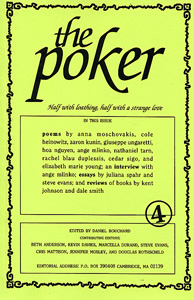 |
Poems
by Anna Moschovakis, Cole Heinowitz, Aaron Kunin, Giuseppe Ungaretti
(trans. Robert Fitterman), Hoa Nguyen, Ange Mlinko, Nathaniel Tarn,
Rachel Blau DuPlessis, Cedar Cigo, and Elizabeth Marie Young. •
Interview with Ange Mlinko. •
A response to Aaron Kunin by Juliana Spahr. •
A letter from Kevin Killian. •
Field Notes, October 2003-June 2004 by Steve Evans. •
Reviews of books by Kent Johnson and Dale Smith.
$10 single issue; $18 for three-issue subscription. |
If you're interested in getting a copy or subscribing, write to editor Dan Bouchard at bouchard[at]mit[dot]edu or drop me a line at feedback[at]thirdfactory[dot]com.
24 July — Saturday
§ Spider | Dir. David Cronenberg, 2003 | Columbia/TriStar | DVD 99min | IMDb link
"As in earlier films by the Canadian director, the outside world mirrors the interior climate with an intensity that gives you a claustrophobic sense of being trapped in a closed system where every image has an ominous coded meaning. Except for the bleached hair of a foul-mouthed prostitute, the film's palette is all faded grays, greens and browns. The streets are empty of people and of traffic, the halfway house nearly bare, with sparsely strewn pieces of rickety furniture and crumbling wallpaper. ¶ When Mrs. Wilkinson draws Dennis a bath, rusty brown water spits into the graying tub into which he crawls and curls up in a stupor. Across the canal near the halfway house rises a sinister gas works. Strange rumblings emanate from inside its tank, which glistens in the moonlight like the shell of a giant night-crawling bug. The air of desolation is deepened by Howard Shore's score, whose groans and scratches recall the knottier chamber music of Shostakovich" (Stephen Holden, writing upon the film's theatrical release in February 2003).

23 July — Friday
§ Retort | "Afflicted Powers: The State, the Spectacle and September 11" | New Left Review 27 | May - June 2004 | 5-21 | on-line edition | link
Iain Boal, T.J. Clark, Joseph Matthews, and Michael Watts apply concepts first articulated by the Situationist International—the society of the spectacle, the colonization of everyday life—to the present conjuncture.
• "At the level of the image...the state is vulnerable; and that level is now fully part of, necessary to, the state's apparatus of self-reproduction. Terror can take over the image-machinery for a moment—a moment, in the timeless echo-chamber of the spectacle, may now eternally be all there is—and use it to amplify, reiterate, accumulate the sheer visible happening of defeat" (14).
• "The logic of the pilots was part fantasy, we would argue, part (proven) lucidity. We could reply to it by saying that the new terrorists succumbed to the temptation of the spectacle, rather than devising a way to outflank or contest it. They were exponents of the idea (brilliant exponents, but this only reveals the idea's fundamental heartlessness) that control over the image is now the key to social power. And that image-power, like all other forms of ownership and ascendancy under capitalism, has been subject to an ineluctable process of concentration, so that it is now manifest in certain identifiable (targetable) places, monuments, pseudo-bodies, icons, logos, manufactured non-events; signs that in their very emptiness and worthlessness (the Twin Towers as architecture were perfect examples) rule the imaginary earth; and whose concentrated, materialized nullity gives terror a new chance—to frighten, demoralize, turn the world upside down" (15).
• "[W]e would argue that the present condition of politics does not make sense unless it is approached from a dual perspective—seen as a struggle for crude, material dominance, but also (threaded ever closer into that struggle) as a battle for the control of appearances" (17).
• "Weak citizenship, then, at the spectacular centre; and weak states in the 'world economy' which the centre works endlessly to exploit. A weak state is one whose local defences against imperial control have (through the implanting of 'bases,' the rifling of natural resources, the helping hand to local elites in the event of indigenous revolt, and neoliberal penetration by the corporations) all been satisfactorily dismantled. A failed state is one where the logic of abjection has been carried, often imperceptibly, too far—so that suddenly the 'flourishing' economy shatters, the bribes no longer produce the shoddy goods, the death rates climb, the effigies of Uncle Sam are paraded through the streets, and up in the mountains or the university dormitories young men and women cover their heads and study The Art of War" (18).
• "Of course, as materialists, we do not believe that one can destroy the society of the spectacle by producing the spectacle of its destruction. This is the nub of our tactical dissent from September 11, leaving aside our strategic rejection of terror as a political means. But the present state does not share our scepticism, it seems. It feels the cold hand of the image-event at its throat. It lives and relives the moment that its machines always had lying in wait for it—the violent rendezvous of speed with enormity, the non-human of technology meeting the non-human of accumulation. As if Cheops himself had looked on while the Great Pyramid was split in two by a bolt from the sun. Just in time for Good Morning America" (20).
Jane Dark's Sugar High! pointed me to the article. For some initial comments, see Equanimity.
§ The Weather Underground | Dir. Sam Green and Bill Siegel, 2002 | Docurama DVD | 92min | IMDb link | Weather Underground timeline
Speaking of the temptations of spectacular terrorism in the face of an inexorably murderous war state.... This fascinating documentary reconstructs the collective process whereby a faction of SDS first captured that group's name and functional apparatus and then proceeded with a campaign of tactical terrorist violence meant to "bring the war home." Driven underground after three people died in an explosion at a West 11th Street townhouse (formerly James Merrill's childhood home) in March 1970, the group continued its terrorist campaign even after the withdrawal of US troops from Saigon in 1975, though with a diminishing hold on people's attention. • Unlike the Black Panthers, many of whose members were jailed or slain under Cointelpro, the white radicals of the Weather Underground (at least those profiled here) not only walked away with their lives, they even experienced a degree of "reintegration" with the society they had struggled against: several are teachers, one owns a bar and was a contestant on Jeopardy, etc. The film doesn't say as much about daily life "underground" as it might, and it doesn't map the trajectory back to ordinary, unrevolutionized, existence in any detail either, but it does bring to the screen, indelibly, the contradictions faced by US citizens who decide that their government has become an unsurvivable proposition and take up arms against it.
22 July — Friday
§ Fahrenheit 9/11 | Dir. Michael Moore, 2004 | 122min | IMDb link
A film this talked and written about is in a sense "pre-viewed" by the time it reaches the provinces. While I was robbed of the chance to respond spontaneously to Wolfowitz slurping spit onto his haircomb, a few images did reach me without passing first through such a relay. • The debris, mostly sheets of paper, swirling against a purple-gray dust haze, just after the towers went down. • The cocky assurance of the Marine recruiters as they hustled Flint kids toward their destiny of filling caskets and wasting away in rehab centers with lines like: "yeah, well you need a lot of discipline in the music business, especially after you make the million." • Footage that I'd nearly forgotten from the massive demonstration on the day of Bush's inauguration.
§ Rick Perlstein | "How Can the Democrats Win?" | Boston Review 29.3-4 | Summer 2004 | 6-13
"Who wants to identify with an unfocused, disorganized, leaderless, sidelined, fumbling, confused, losing, scared organization? Vote with it sometimes, maybe, but identify with it?" (11) • "As President Clinton put it in the American Prospect interview, 'the public is operationally progressive and rhetorically conservative" (12). • From a footnote: "Presidential politics has always been an arena of fear, a dark continent. Conveying a political vision is almost always like telling a bedtime story: the voters' fears must be named, described, to convince them that this particular candidate is the one to vanquish the scary monster under the bed—that this candidate, not the opponent, is the guarantor of security" (13n23). The sickening condescension of this observation strikes me as typical of the way political operatives think: Perlstein is no better than his DLC rivals in this regard, and his vision no more inspiring than theirs either, precisely because he conceives of it as a bedtime story for cowering children. A gentleman, I'll leave it to oil thugs like Dick Cheney to blurt out the appropriate expletives.
21 July — Friday
§ Anchorman | Dir. Adam McKay, 2004 | 91min | IMDb link
Frank Rich's 18 July column "Happy Talk News Covers a War" tricked me into giving this unrelievedly witless film a chance. Some in the theater laughed at the braindead weatherman's lines, but otherwise even the target audience (late teens) remained grimly unamused. • For a fan's take, see Unquiet Grave.
§ Patrick Cockburn | "Diary, Baghdad, 5 July 2004" | London Review of Books | 22 July 2004 | 34-36
"Suicide bombers, car bombs, and rocket attacks have paralysed Baghdad; the US bases are defended by increasingly elaborate fortifications. The 14 July Bridge over the Tigris, which leads into the Green Zone, is blocked by sandbags and razor wire. A notice hanging from the wire reads: 'Do not enter or you will be shot.' US soldiers in Baghdad are trigger-happy and they like Iraqis to know it. All over the city, streets are closed, sometimes cutting of whole districts, by concrete blocks intended to defend buildings that house American troops, foreigners, Iraqi police, and Iraqi officials" (35).
18 July — Sunday
§ Outfoxed: Rupert Murdoch's War on Journalism | Dir. Robert Greenwald, 2004 | 75min | DVD screened at MoveOn House Party hosted in Bangor by the Peace and Justice Center of Eastern Maine | IMDb link | official site
Straight-ahead agit-prop made on the fly and under the radar: unlikely to command interest once the topical charge is spent, but a serious attempt to deprive Fox News of such legitimacy as it commands in the present moment. • There were about eighty people in attendance on a sweltering (for Maine) evening, mostly middle-aged and up, mostly in agreement with the film's argument before the play button had been hit. • As with the Democratic caucuses in the spring, which filled the allotted room in Orono's Town Hall to capacity and outstripped the party's ability to supply forms to everyone, it's nice to see far more people in the room than even the organizers had expected.
17 July — Saturday
§ Alain de Botton | How Proust Can Change Your Life | New York: Pantheon, 1997 | 199pp | $19.95 | bought used for $8
Nine columns extracting wisdom of a sort from Proust's In Search of Lost Time. I initially admired the cleverness implicit in disguising a critical book as an advice column, but the repetitive structure of the chapters, not to mention the decidedly un-Proustian preponderance of prattle over actual profundity, soon enough made me impatient. • On revisability as one of the things that makes writing preferable to friendly conversation: "As Proust went back over what he had written, he repeatedly saw the imperfections in his initial attempt. Words or parts of sentences were eliminated; points that he had judged complete seemed, as he went back over the text, to be crying out for recomposition, or elaboration and development with a new image or metaphor. Hence the mess of the manuscript pages, the result of a mind perpetually improving on its original utterances. ¶ Unfortunately for Proust's publishers, the revisions did not cease once he had sent his handwritten scrawls to be typed up. The publishers' proofs, in which the scrawl found itself turned into elegant uniform letters, only served to reveal yet more errors and omissions, which Proust would correct in illegible bubbles, expanding into every stretch of white space available until, at times, they overflowed into narrow paper flaps glued onto the edge of the sheet. ¶ It might have enraged the publisher, but it served to make a better book. It meant that the novel could be the product of the efforts of more than a single Proust (which any interlocutor would have had to be satisfied with); it was the product of a succession of ever more critical and accomplished authors (three at the very minimum: Proust 1 who had written the manuscript + Proust 2 who reread it + Proust 3 who corrected the proofs). There was naturally no sign of the process of elaboration or of the material conditions of creation in the published version, only a continuous, controlled, faultless voice revealing nothing of where sentences had had to be rewritten, where asthma attacks had intruded, where a metaphor had had to be altered, where a point had had to be clarified, and between which lines the author had had to sleep, eat breakfast, or write a thank-you letter. There was no wish to deceive, only a wish to stay faithful to the original conception of the work, in which an asthma attack or a breakfast, though part of the author's life, had no place in the conception of the work, because, as Proust saw it: A book is the product of another self to the one we display in our habits, in society, in our vices" (115-17).
July 1 — 15 July
§ 24: Season Two | 20th Century Fox | 6 DVDs | BBC Episode Guide (contains spoilers) | Fox site (ditto)
10 July — Saturday
§ Parallel Lines | Dir. Nina Davenport, 2004 | Maine International Film Festival, Bangor Screening | 98min | IMDb link | official site
The film documents the six weeks Davenport spent traveling home—in a generic rental car, along back roads—to a New York City apartment that formerly looked out on the World Trade Centers, from San Diego, where she'd been finishing up a gig when the 9/11 attacks took place. Like Agnes Varda in The Gleaners and I, Davenport has a knack for insinuating herself into the lifeworlds of the strangers she meets: as they respond to her own openness and empathetic directness, the various people interviewed in the film find themselves confiding more than they'd expected to. What one hears in their variously accented voices is that life in the US consists mostly of bewildered suffering, and what one learns—if one didn't know it before—is that the spectacular damage inflicted by Al Qaeda's brilliantly vicious psych-op was a blow, but it landed as one in a long, intensely individuated, sequence of blows, not as an event apart. • In comments following the screening, Davenport indicated that her hopes of national distribution for the film were dwindling: it's a shame to see such a smart, humane, and popular—remember popular culture? the one before commercial culture?—shelved without receiving the audience it deserves.
02 July — 25 July
§ Tour de France 2004 | Daily Peloton "Jambon Reports" | TDFblog | Official Site
nb archive
June 1-15, 2003 • June 16-30, 2003

